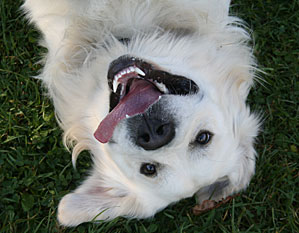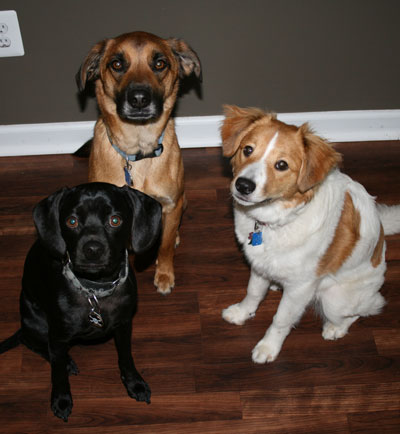I love my mutts – I don’t think there is any better breed out there than a good mutt! A lot of people have misconceptions about mutts or think they’re somehow inferior to purebreds. It might be interesting to dig a little deeper into the world of non-purebred pups. The terms “mutt” and “mongrel” get thrown around pretty loosely these days, and they often come with a derogatory air. But anyone who owns a mixed dog knows that they have just as many, if not more wonderful qualities than purebred pets! The stigma that has followed mixed breed dogs is losing it’s grip, which is a great thing. Let’s talk about mutts so you can see why they can be just right for you!
Mixed Terms
First let’s get the terminology right. Mutt. Mix. Mongrel. Bitsa. Potcake. Heinz 57. These are all terms that denote a dog of more than one breed origin. The true definition of mutt and mongrel is an individual resulting from the interbreeding of diverse breeds or strains; especially: one of unknown ancestry. In the case of canines, these are individuals of unknown ancestry that belong to no single organizationally recognized breed and are not the result of selective breeding. Today, much of the terminology has become blurred with “designer breeds” rising in popularity. Designer Dogs are selectively bred hybrids, specialized mixes of 2 or more purebred dogs intentionally bred to retain specific traits of those breeds. The term “mixed breed” encompasses dogs of mixed, untraced ancestry, though it is often used in reference to hybrids as well to make everything nice and confusing.
A Dog of a Different Color
Some mutts can look so much like a purebred dog that it is nearly impossible to tell that there is something else in the genetic pot. I have one of these, her name is Sara. She’s a pit bull mix. I know this because I met her mom, who was very clearly a pit bull mix dog. Sara, however, carries no resemblance to her pit bull ancestry (other than a bit of an attitude and her love of cuddles). She looks just like a border collie! Her sisters in the litter looked just like their mom; a tan pit bull. Who knows why she hit the genetic jackpot and got the long lustrous and silky hair.
Why does she look like a border collie and not a pit bull like her mom and sisters? It all comes down to genetics and dominant genes. Fortunately for you, this gets to be a little too scientific and complicated for me to explain in this blog.
Sorting Fact from Fiction
 So, what makes mutts better than a purebred, or vice versa? There’s many different schools of thought on this subject, but I’ll break it down into a few things that definitely define whether or not a purebred or a mutt is best for your house:
So, what makes mutts better than a purebred, or vice versa? There’s many different schools of thought on this subject, but I’ll break it down into a few things that definitely define whether or not a purebred or a mutt is best for your house:
- Purebreds are the result of generations of selective breeding to achieve a desired trait or personality. If you have small children, you may want a breed of dog that is known to be gentle and tolerant, like a Beagle. Assistance dogs are typically Labradors because they’re known for their intelligence and loyalty. Cane Corsos are intensely protective and are used as guard dogs. You should thoroughly investigate any breed of dog before seeking out a reputable breeder.
- Mutts can be healthier than some purebreds. This is especially the case for purebreds that are the product of years of inbreeding or irresponsible breeding, like the case of puppy mills. If your new puppy was born in a mill, there is the distinct possibility that they may have a genetic disorder or become ill due to the circumstances of their birth. If your dog comes from a responsible breeder who is screening for defects or diseases, there is a much greater chance your dog will be healthy.
- Mutts are known as “healthier” than these irresponsibly bred purebreds because they have a wider array of genetic materials. This is actually kind of false. You don’t know the origins of your dog, therefore it is unknown what kind of genetic dispositions they might have in their DNA. No matter what kind of dog you have, you should always be prepared for the unexpected. Consider investing in pet insurance to cover any unplanned medical expenses.
No matter what kind of dog you choose, be prepared and make sure that a dog is the right pet for you. Consider your lifestyle, home situation, stability, dependability, and financial situations before driving to the shelter.
As always, we like to promote adoption for pets. There are tons of pet rescues devoted to purebred dogs in need of homes, just because you rescue doesn’t mean you can’t have your breed of choice. Do your research, take good care of them and you’ll be rewarded for years to come!
So, tell us, do you have mutts, purebreds, or designer mixed breeds in your house?
 That Pet Blog That Pet Place Pet Blog
That Pet Blog That Pet Place Pet Blog




I have two mutts and a purebred, a collie/terrier mix, a “boxador” (lab/boxer), and an American Cocker. By far my cocker has had the most vet visits. She has no many health issues: ear infections, eye infection, eating problems. These are all problems associated with her breed. This is why I feel that mutts are much healthier dogs.